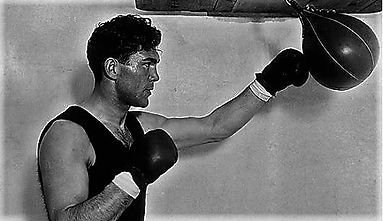
Dispatches
By Liz Gilmore Williams

A Real Fighter

Max Schmeling

He went on to defeat Joe Louis in 1936
Though some people regarded Max Schmeling a Nazi shill, the man was more complex than that. With Hitler on the march in the late 1930s, western democracies imperiled, and race relations entering a contentious era, Max Schmeling represented more than sport.
Born in 1905, Schmeling learned about boxing from his father, who’d seen the sport in his travels as ship’s navigator. As a teen, Max saw a film of a championship fight and was hooked. He left home and began fighting in amateur tournaments. Schmeling turned professional in 1924 and maintained a good win-loss record. In 1927, he won the European heavyweight championship, the first German to do so.
As European champion, Schmeling gained entreé to Berlin’s elite society. In the era known as the Weimar Republic, boxing had become popular and Schmeling, a celebrity. He told himself, “You’re a man from a humble background, what you didn’t learn in school, you’ll learn now. Catch up.” His friends included race car drivers, playwrights, filmmakers, actors, and dancers. In 1932, he married a beautiful blonde movie star, Anny Ondra, and the two became Germany's most glamorous couple.
Schmeling had to go to America to become the world champion and hired American Joe Jacobs, a Jewish manager, to get him in the ring. On June 12, 1930, at Yankee Stadium, Schmeling faced Jack Sharkey, who hit him below the waist in the fourth round. Sharkey was disqualified for the low blow, and Schmeling became the new heavyweight champion of the world, the only time the title was decided by a foul. “I can't accept the title!” Schmeling said to his trainer. “To win it this way doesn't mean anything to me.” He went on to defeat Joe Louis in 1936 for the win he wanted in one of the most storied boxing matches ever.
His victory had further endeared him to Hitler, who released a film of the fight as a feature throughout Germany. By this time, Hitler’s Nationalist Socialist Party began harassing the artists in Schmeling’s social circle, some of whom left for Hollywood. But the fighter received favored treatment from the authorities. As a representative of Germany overseas, the boxer was useful to the Nazis as a mouthpiece. At a press conference in America, Schmeling told journalists that everything was okay and quiet in Germany and denied that Jewish people were persecuted. His assignment was to calm the Americans.
Despite pressure from Hitler and his top aides, however, Schmeling refused to join the Nazi party as well as fire his Jewish manager as officials demanded. The Nazis were particularly incensed by an incident in 1935 in Hamburg. To honor a Schmeling victory, spectators began to sing the national anthem, raising their arms in the Nazi salute. Jacobs joined in, throwing up his arm with a large cigar in his hand. The entire incident was filmed, infuriating Nazi officials.
His country drafted Schmeling at age 34 into the German army as a paratrooper. In the Battle of Crete in 1941, he was knocked unconscious upon landing and captured by British troops. Schmeling believed that the perilous assignment had been the Nazi Party’s revenge on him. His failure to condemn his treatment by his British captors further angered Nazi officials.
In 1938, Schmeling took an enormous risk by hiding two teenaged sons of a Jewish friend in his room in Berlin’s Excelsior Hotel on Kristallnacht, claiming he was sick and refusing visitors. When an opportunity arose, Schmeling smuggled the boys out of the country. Henri Lewin, who became a Las Vegas hotelier, credits Schmeling with his life; the modest Schmeling made no mention of this episode in his autobiography.
Later in the war, Schmeling staged boxing exhibitions for German soldiers in occupied Europe and visited GIs in German POW camps. Some American soldiers greeted him as a sports hero; others shunned him. This author has interviewed a former POW who gladly shook his hand.
Schmeling returned to boxing in 1947 before retiring at age 43. In the privation of post-war Germany, Schmeling and his wife scraped by until a former New York boxing commissioner turned Coca Cola executive remembered Schmeling as a non-Nazi hero to the German people and offered him the Coke franchise in Germany. Schmeling finally prospered as a businessman and died at age 99 in 2005.